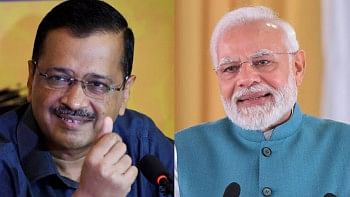Editors meet prof Yunus: Call for national unity, reforms

Chief Adviser Prof Muhammad Yunus and editors of top media houses yesterday called for national unity to consolidate the reforms that will be made to strengthen institutions and put an end to the culture of vote rigging.
During a meeting with the editors, the chief adviser urged the media to publish news on the interim government's mistakes without hesitation.
The editors called for the cancellation of repressive laws like the Digital Security Act. If need be, the clauses of draconian laws, used to silence journalists, can be suspended immediately and the laws can be amended later, they said.
"At the very least, it should be announced that the clauses of these laws that are used to repress journalists will not be enforced and that the reforms will happen over time," said Mahfuz Anam, editor and publisher of The Daily Star, emerging from the meeting at the state guesthouse Jamuna.
"We want a national unity to be established in Bangladesh. It was part of our discussion," he said.
He said the editors expressed their expectation of major reforms, like amending the constitution and strengthening the local government.
"We want reforms to the autonomous bodies, like the Anti-Corruption Commission, Human Rights Commission, and the Election Commission, to make them truly people-oriented institutions, especially the Election Commission, so that all future elections truly reflect the thoughts of the voters. We want an Anti-Corruption Commission that would work independently," Mahfuz said.
The editors emphasised that the state-run media outlets, including BTV, BSS, and Bangladesh Betar, should be made autonomous so that those can perform professionally.
According to the editors, Yunus said that he believes in independent journalism, and made a special appeal so that the media, through their work, help create a national consensus.
"I realised that he truly wants a vibrant media. He genuinely believes in press freedom. If we've ever had a media-friendly head of government, we have one now," Mahfuz said.
Editors at the meeting said all allegations against the media should be referred to the press council first.
They also urged activities regarding four proposed laws, which they believe would curb citizens' rights, be stopped.
Mahfuz mentioned that Yunus asked the editors how long the interim government should stay. Many expressed their opinions on this matter, but the main gist was that it would depend on the government's agenda, he said.
He noted that Yunus wants the media to discuss these issues in detail and provide him with an idea of what the nation wants.
"Yunus said he does not have his own view on the tenure of his government; rather, he wants to know the people's opinion on it."
Chief Adviser's Press Secretary Shafiqul Alam, at a press conference at the Foreign Service Academy, said Yunus wanted to hear from the editors what would be a "reasonable" tenure of the interim government.
An editor said it should be between two and three years. Another said it should be two years. Most editors, however, said the tenure of the interim government should be determined by the time needed to carry out vital reforms, Shafiqul said.
The Editor's Council in a press release issued later said most of the editors at the meeting were members of the council. When Yunus asked about their opinions on the interim government's tenure, most did not mention any time.
Some had expressed their personal opinions, it said.
"Most of the editors present at the meeting did not say anything about the tenure of the government. They urged for quick restoration of law and order, ensuring security of the people and factories, and presenting the government's agenda or roadmap for reforms to the nation."
The chief adviser's press wing also issued a clarification stating, "During the meeting with Chief Adviser Professor Muhammad Yunus, several editors on Tuesday suggested that the tenure of the interim government could be two to three years. Most editors, however, said the tenure of the interim government should be determined by the time needed to carry out vital reforms."
During his press briefing earlier, Press Secretary Shafiqul said Yunus and the editors were in favour of having a national unity to consolidate the reforms.
He said the editors made different suggestions, like amending or rewriting the constitution, setting up of a constitution commission, and a media commission.
Ways to make the police force effective and strong; a police commission; reforms to the Election Commission; and changes of the election commissioners were discussed.
There was also a suggestion to make the cabinet more proactive, he said.
"This is a great opportunity for Bangladesh, for all of us to repair the state and to take Bangladesh to a new level," Shafiqul quoted Yunus as saying.
Deputy Press Secretary Azad Majumder said the discussion was recorded and that each adviser would listen to the opinions of the editors.
The one-and-a-half hour meeting that began around 11:00am was attended by Matiur Rahman, editor and publisher of Prothom Alo; Tasmima Hossain, editor of Ittefaq; Nurul Kabir, editor of New Age; Shamsul Huq Zahid, editor of The Financial Express; Altamash Kabir, editor of Sangbad; Dewan Hanif Mahmud, editor and publisher of Bonik Barta; Mahbub Morshed, managing director of BSS; Zafar Sobhan, editor of Dhaka Tribune; Mostafa Mamun, editor of Desh Rupantor; Mostafiz Shafi, editor of Pratidiner Bangladesh; Inam Ahmed, editor of The Business Standard; Hasan Hafiz, editor of Kaler Kantho; AMM Bahauddin, editor of Inquilab; and Abul Momen, editor of Amader Shomoy.
Chattogram based Dainik Azadi and Purbokone editors MA Malek and M Ramiz Uddin Chowdhury and Bogura based Daily Karatoa Editor Mozammel Haque also attended the meeting.


 For all latest news, follow The Daily Star's Google News channel.
For all latest news, follow The Daily Star's Google News channel. 



Comments